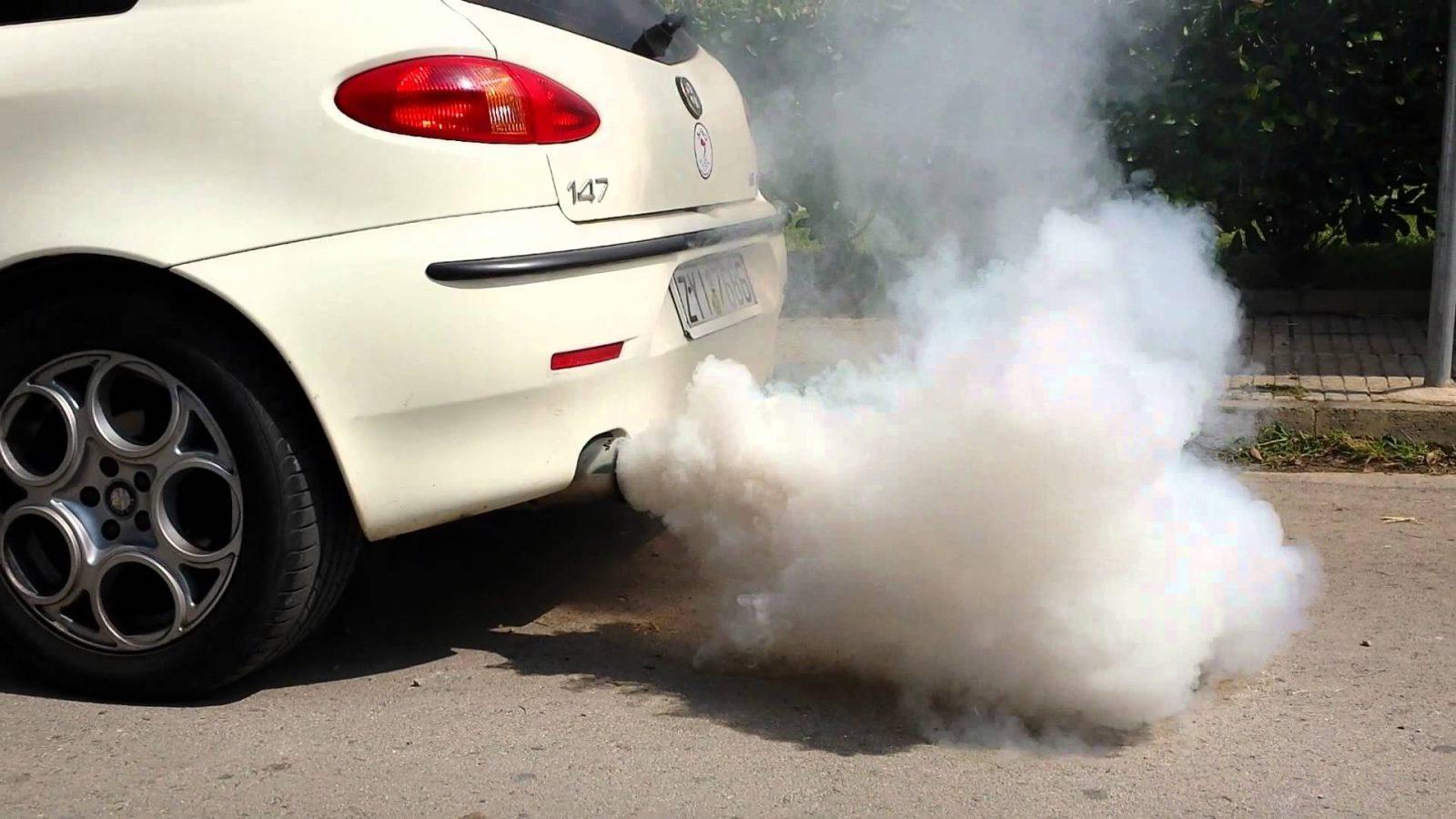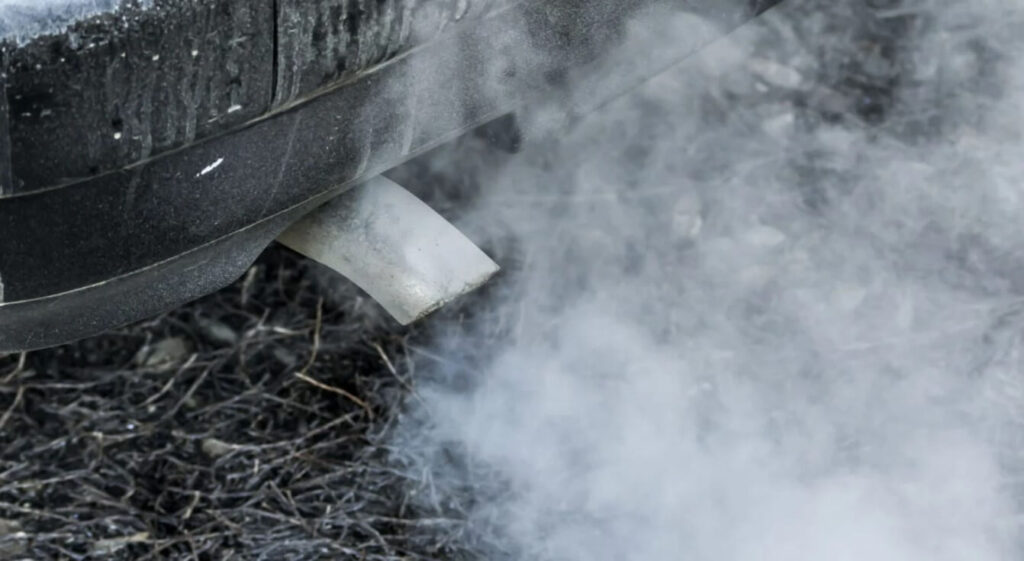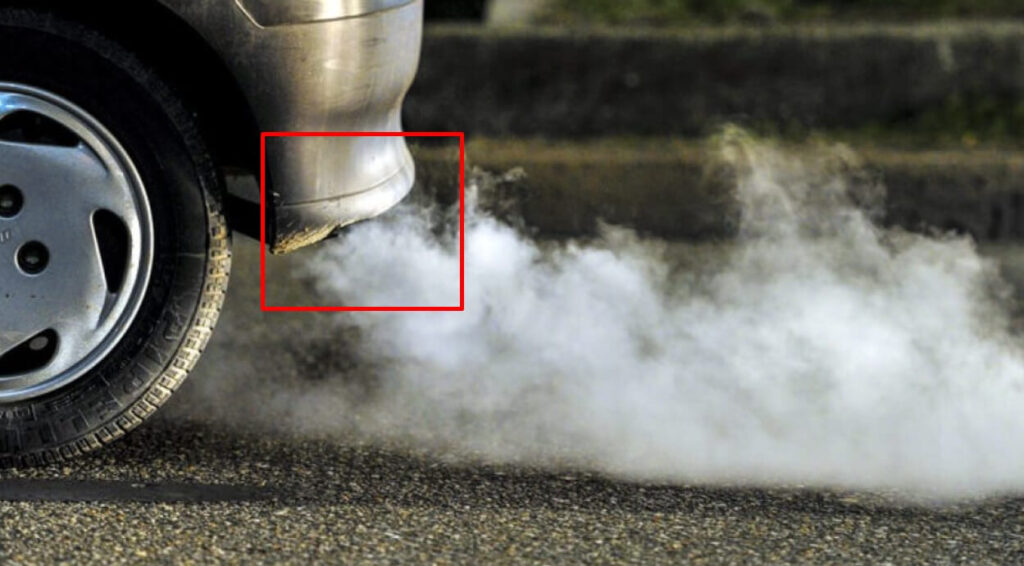A car may be smoking from the exhaust due to engine oil or coolant leaking into the combustion chamber. This can result from a variety of issues, including a damaged head gasket or engine block, faulty piston rings, or a damaged cylinder wall.
It is important to address this issue promptly, as driving with a smoking exhaust can damage the engine and emit harmful pollutants into the air. Additionally, depending on the root cause of the issue, it may be unsafe to continue driving the vehicle until the problem is resolved.
In this article, we will delve deeper into the causes and solutions for smoking car exhaust, as well as how to prevent this issue from occurring in the future.

Is it okay to drive your car if its smoking from the exhaust?
Driving a car that is visibly smoking from the exhaust is not recommended, as it may indicate a serious issue with the engine or other components. The main cause of visible smoke is often related to engine oil or coolant leakage.
It could be a sign of a blown head gasket, damaged piston rings, or other critical engine problems. Continuing to drive the vehicle in this condition can lead to further damage and potential engine failure.
Is it normal to have smoke coming out of exhaust?
No, it is not normal to have smoke coming out of the exhaust. The main cause of smoke from the exhaust is often an indication of an issue within the engine or exhaust system. The three main types of smoke are blue, white, and black. Blue smoke typically signifies oil burning, which could be due to worn piston rings or valve seals.
White smoke may indicate coolant or water entering the combustion chamber, possibly due to a blown head gasket. Black smoke is usually a result of excessive fuel being burned, suggesting problems with the fuel injection system or air-fuel mixture.

How do you fix smoke in a car exhaust?
Fixing smoke in a car’s exhaust depends on the type of smoke observed. For blue smoke (indicating oil burning), addressing worn piston rings or valve seals may be necessary. White smoke (suggestive of coolant issues) may require fixing a blown head gasket or addressing a coolant leak.
Black smoke (resulting from excessive fuel burning) can be resolved by addressing issues with the fuel injection system or correcting the air-fuel mixture.
Smoke from exhaust when accelerating
Smoke from the exhaust when accelerating is a concerning symptom that may indicate various issues. If the smoke is black, it could be a sign of a rich fuel mixture, problems with fuel injectors, or air intake issues. Blue smoke may suggest oil burning due to worn piston rings or valve seals.
White smoke often indicates coolant entering the combustion chamber, possibly due to a blown head gasket. In any case, it’s crucial to have the vehicle inspected by a qualified mechanic promptly.

Grey smoke from exhaust when accelerating
Grey smoke from the exhaust when accelerating may be indicative of a few potential issues, with the most common cause being an engine burning oil. This could be due to worn piston rings, valve stem seals or other internal engine components. It’s essential to consult with a qualified mechanic to diagnose the specific problem.
White smoke from exhaust when accelerating
White smoke from the exhaust when accelerating is often a sign of coolant entering the combustion chamber. The primary cause is typically a blown head gasket, allowing coolant to mix with the fuel and air in the engine. This issue requires prompt attention from a qualified mechanic, as driving with a compromised head gasket can lead to engine damage. Ignoring the problem may result in overheating and severe engine issues.
Black smoke from exhaust when accelerating
Black smoke from the exhaust when accelerating is commonly caused by a rich fuel mixture, indicating an excessive amount of fuel being burned in relation to the available air. This condition can result from issues such as a malfunctioning fuel injector, a faulty air intake system, or problems with the engine control unit.
Car blowing white smoke but not overheating
The main cause of a car blowing white smoke without overheating is often a coolant-related issue, typically a blown head gasket. When the head gasket fails, it allows coolant to mix with the combustion chamber, leading to the emission of white smoke.
While the engine may not be overheating immediately, driving with a compromised head gasket can eventually result in overheating and severe engine damage.

How to fix grey smoke from exhaust?
Fixing grey smoke from the exhaust, which typically indicates oil burning, requires identifying and addressing the root cause. The most common culprits are worn piston rings, valve stem seals, or other internal engine components allowing oil to enter the combustion chamber.
To resolve this issue, consult with a qualified mechanic for a thorough diagnosis. Depending on the severity of the problem, repairs may involve replacing worn components, such as piston rings or seals, or addressing more extensive internal engine issues.

Understanding Exhaust Smoke
If you notice smoke coming from your car exhaust pipe, it indicates an underlying issue that needs attention. While exhaust smoke might seem harmless, it may indicate serious problems that can affect your car’s performance and longevity. Understanding the different types of exhaust smoke can help you identify the problem accurately.
Identifying The Type Of Smoke Coming From The Exhaust
Since different colors of smoke may point to different problems, it is crucial to identify the kind of exhaust smoke accurately. Here is what to consider:
- Observe the color of the smoke- if it’s white, black, or blue.
- Consider the frequency of the smoke occurrence.
- Check whether the smoke emits a bad smell or strong odor when it comes out.
- Analyze whether the smoke is thick or thin.
Significance Of The Color Of Smoke In Diagnosing The Problem
The color of your car’s exhaust smoke is an excellent way to identify an issue with your vehicle, but it takes the intervention of a professional mechanic to identify the exact issue. The significance of the color of smoke in diagnosing the problem includes the following:
- White smoke may signify a cracked cylinder head, a damaged engine block, or a blown gasket.
- Blue smoke can indicate that the oil is leaking into the combustion chamber or a piston is functioning poorly.
- Black smoke is usually associated with excess fuel, necessitating the need to replace the fuel system and filters in some cases.
It is critical to know what smoke from your exhaust means. When you notice any abnormality, you should schedule an appointment with an expert mechanic immediately. Identifying the issue and fixing it early can help you save significant time and money in the long run.
Common Causes Of Exhaust Smoke
Exhaust smoke can be a worrying sight for any driver. It indicates that something is not right with the vehicle’s engine, and in some cases, it could even be dangerous. Here are some of the most common causes of exhaust smoke:
Faulty Turbocharger
A bad turbocharger can cause blue or black smoke to come out of the exhaust. This is because the turbocharger is responsible for compressing the air that goes into the engine. When the turbocharger fails, it can force oil into the engine’s combustion chamber, which produces smoke.
Worn-Out Piston Rings
When an engine’s piston rings wear out, it can cause blue or gray smoke to come out of the exhaust. This type of smoke is usually more noticeable during acceleration. Worn-out piston rings allow oil to pass through and enter the combustion chamber.
Failed Head Gasket
When a head gasket fails, it can cause white smoke to come out of the exhaust. A head gasket is a crucial part of the engine that seals the cylinder head to the engine block. When it fails, it allows coolant to enter the combustion chamber, which produces the white smoke.
Engine Oil Leaks
An engine that is leaking oil can cause blue or gray smoke to come out of the exhaust. This is because the oil is burning in the exhaust system. The smoke will likely be more noticeable when the engine is first started, and it may dissipate as the engine warms up.
Problems With The Catalytic Converter
A damaged or failing catalytic converter can cause black smoke to come out of the exhaust. The converter is responsible for converting harmful emissions into less harmful ones. When it fails, unburned fuel can be released into the exhaust system, causing black smoke.
Keep in mind that exhaust smoke should never be ignored. It’s always wise to have a professional mechanic diagnose and fix the issue.
Diagnosing The Problem
Whether you have a new car or an old one, it’s always concerning to see smoke coming out of the exhaust. Smoke from the exhaust can indicate several issues with your vehicle, ranging from minor to major problems. The first step to fixing the problem is to determine the root cause of the smoke.
In this section, we’ll look at the steps you can take to diagnose the problem.
Conducting A Visual Inspection
One of the first things you should do when you notice smoke coming from your exhaust is to conduct a visual inspection to identify the color of the smoke. Understanding the color of the smoke can help you identify the root cause of the problem.
Here are the types of smoke you may see and what they could indicate:
- White smoke: This may indicate a coolant leak, which could lead to engine damage or a blown head gasket.
- Blue smoke: This could be a sign of burning oil, which could mean a problem with the engine’s oil system.
- Black smoke: This may indicate an issue with the fuel system, such as a clogged air filter or fuel injector problems.
Using Diagnostic Tools To Identify The Cause Of The Problem
If you’re not sure about the cause of the smoke, it’s best to use diagnostic tools to help you pinpoint the issue. There are many diagnostic tools available that can help you determine the root cause of the smoke, ranging from handheld OBD2 scanners to professional-grade diagnostic equipment.
Some things that diagnostic tools can help identify include:
- Faulty sensors: The oxygen sensor or the catalytic converter may not be functioning properly.
- Misfiring engine: This can be caused by a faulty spark plug or a blocked fuel injector.
- Bad egr valve: This can cause black smoke to come out of the exhaust.
Importance Of Seeking Professional Help Where Necessary
While it may be tempting to try and fix the problem yourself, it’s always a good idea to seek professional help when dealing with issues related to your car’s exhaust. A professional mechanic will have the knowledge and experience needed to diagnose and fix the issue properly, ensuring that your car runs smoothly and safely.
Additionally, trying to fix the problem yourself could cause more harm than good, leading to additional repair costs in the long run.
Smoke from the exhaust can indicate several issues with your vehicle, ranging from minor to major problems. By conducting a visual inspection, using diagnostic tools, and seeking professional help when needed, you can identify the root cause of the problem and fix it before it causes serious damage to your car.
Fixing The Problem
Why is my car smoking from the exhaust: fixing the problem
The sight of smoke coming out from your car’s exhaust could be alarming and a sign that something is not right. Fortunately, most smoking problems can be resolved through simple fixes. Here’s a quick overview of the solutions to different smoking problems your car’s exhaust may have.
Overview Of The Different Solutions For Different Problems
- Identify the color of the smoke. Gray, white, blue, or black smoke corresponds to different issues in your car.
- Some of the common problems that can trigger exhaust smoke include worn out piston rings, a damaged head gasket, or a clogged air filter.
- To fix the smoking issue properly, you will need to identify the root cause of the problem.
Diy Fixes For Minor Issues
If the smoking problem is minor, such as light smoke during startup, you can try to fix it by yourself with the following steps:
- Use high-quality fuel for your car. Poor-quality fuel may cause combustion problems.
- Check and replace the air filter. Clogging of the air filter may lead to reduced airflow and cause smoke.
- Conduct regular oil changes according to your vehicle’s manual guidelines.
- Add engine oil to your car when the oil level is low. Lack of engine oil could lead to smoke.
Professional Help For Complex Problems
If the smoking issue is serious, seeking professional help is important. Some of the complex problems that require professional assistance include:
- Faulty engine parts can affect the engine function. Your mechanic can help to diagnose and replace the worn-out parts.
- A damaged head gasket can lead to oil leaking into the engine combustion chamber. This causes excessive smoke. It is best to let a professional repair or replace the gasket.
- If you observe black smoke from your car’s exhaust, it may indicate a malfunctioning fuel injector. A mechanic can diagnose and clean or replace the injector depending on the severity of the problem.
Ignoring smoking issues from your car’s exhaust is not advisable. Early detection and prompt fixing can save you from complex and costly repairs. With proper maintenance, regular checkups, and using high-quality fuel, you can keep your car smoke-free.
Frequently Asked Questions For Why Is My Car Smoking From The Exhaust
Why Is Smoke Coming Out Of The Car Exhaust?
If there’s visible smoke coming out of the car exhaust, it could be a sign of a serious issue like burnt-out piston rings, damaged head gasket, or poor engine oil.
Can Driving With A Smoking Engine Damage It?
Yes, driving with a smoking engine can damage it as the engine risks permanent damage. A car engine can suffer from warping, cracks or gasket failure if the problem remains unaddressed.
What Should I Do If My Car Is Smoking?
If your car is smoking from the exhaust, it’s best to take your car to a professional mechanic. Ignoring this sign could prove to be expensive in the long run. Your mechanic can diagnose the problem and fix it.
How Much Does It Cost To Repair A Smoking Engine?
The cost of repairing a smoking engine depends on the extent of the damage. If it’s a minor fix, the cost could range from $100 to $500. For bigger problems like a new engine, it’s worth between $3,000 and $8,000.
Can A Clogged Air Filter Cause A Smoking Engine?
A clogged air filter won’t cause a smoking engine. Instead, smoke from an automobile’s exhaust is an indication that there’s an underlying issue. A dirty air filter prevents air from mixing with gasoline, resulting in a fuel-rich air mixture that could cause issues down the line.
Conclusion
To sum it up, smoke coming out of the car’s exhaust is a warning sign that something is wrong with the vehicle. It is a clear indication that your car is not operating as it should be, and it needs immediate attention.
Whether it is due to a minor issue or a major one, ignoring the problem can worsen the situation and result in costly repairs. Therefore, it is important to take quick action and identify the underlying cause of smoke coming from your car’s exhaust.
Together with your mechanic, you can work towards restoring your car’s proper functioning, reducing harmful emissions, and ensuring your safety on the road. Remember, regular car maintenance and timely check-ups can go a long way in avoiding such situations and saving you from unnecessary expenses.
So, have a vigilant eye, take care of your vehicle, and stay safe on the road.
